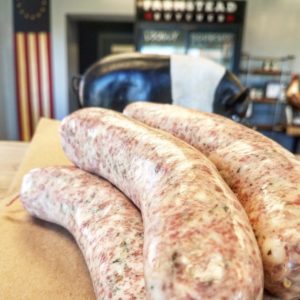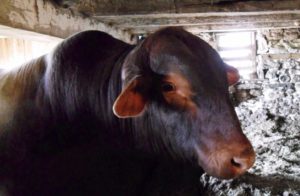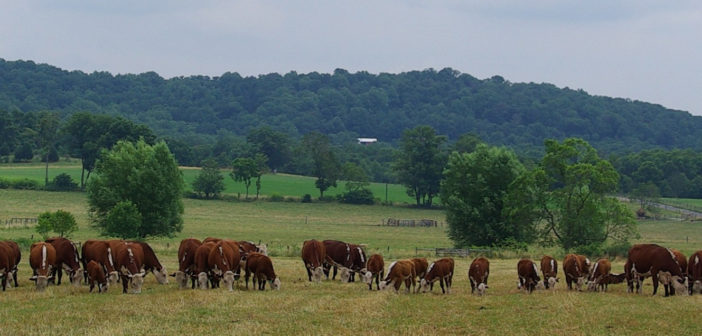How local farmers are adapting to meet the demands of today’s consumer
By Jennifer Mellace
As the world continues to deal with the ever-changing demands of the COVID-19 pandemic, local communities are reevaluating how and where they buy their commodities, including their meat and produce. Driven by the concern of safer food handling as well as the desire for healthier options, individual consumers from around the area are flocking to local farms, and farmers are answering the call.
An Overnight Demand
The Farmstead Butcher, located on Rettland Farm in Gettysburg, produces grass-fed pastured pork, pastured broiler chickens, grass-fed lamb, pastured hen eggs, and organic grains. When COVID-19 struck, owner Beau Ramsburg had to make an overnight pivot from primarily producing and processing meat for wholesale customers, like restaurants, to producing and processing meat for retail customers. “This meant changing the types of products that we made, changing the way they were cut, packaged, and labeled, and finding better ways to reach retail customers, which we are still working on,” says Ramsburg.

The business also had a huge surge in the volume of products it is processing. “Since a large and growing part of our business is processing meat and poultry for other small farms in the region, we’ve experienced a significant demand in not only the meat we produce here on our own farm, but also from our farmer clients as well,” he says. “Our team has been working long hours since mid-March to help as many farmers as possible reach as many consumers as possible. We are essentially at full capacity or beyond for processing meat through the end of the year and have substantial numbers of people on waiting lists as well.”
Linda Moose, owner of Chapel Ridge Meat & Mercantile in Gettysburg, is one of the farms that has experienced the difficulty in the processing time. “We’ve seen an increase in our business, but we have a backlog getting our beef processed,” says Moose. “Our farm is overflowing with beef ready to go to consumers, and we can’t get them processed. We also cannot sell our beef at the open market due to having no buyers. Again, our buyers can’t get the beef processed either. So no sale for them.”

Moose explains that Chapel Ridge tries not to sell at open market due to unheard of low prices, even if there were buyers. “Americans must contact their congressmen and urge them to stop the monopolies of our food processing by foreign processors,” she says. “As happened with this pandemic, most of the big packers [who are foreign owned]closed down, leaving our citizens without meat. Just look at the meat shelves in our grocery stores. Foreign investors can close down our food supply completely if they see fit to do so.”
Ramsburg agrees that local consumers have changed the way they think about their food, and he believes that the pandemic has cast a harsh light on modern food production. “Consumers have begun to realize the fragility that exists by allowing their food supply to rest in the hands of a few very large multinational companies, and that an alternate system of many diverse, independently-owned farms and processing businesses dispersed across the country offer them greater security and resilience in their food supply,” he says. “It is unsettling and uncomfortable for us to address these issues as a society, but I feel that the meat shortages and processing bottlenecks resulting from the pandemic have [shown]us that we must.”
Seeking Safer Options
Stone Ridge Manor, a Gettysburg family-owned and operated farm offering custom cuts of naturally fed-and-finished beef, lean ground beef, all-beef natural hot dogs, and sweet and Italian-style sausages, has also seen an increase in demand. Prior to COVID-19, a fair amount of the farm’s sales were to local restaurants and Gettysburg College. That all stopped abruptly when the quarantine went into effect. But what was lost there was gained in individual sales, which increased dramatically.
“People are being more careful now and researching where their food comes from,” says owner Dan Snyder. “When people buy products in the store, including organic items, they don’t know where exactly it’s coming from. Now, with everything that has happened, people want to know that the animals are raised in a healthy environment. Same is true with fruits and vegetables.”
Snyder raises his cattle on quality grass and hay and provides a feed that doesn’t contain hormone additives. “We have complete control over the product,” he says. “All our animals are raised on the farm, and we have very stringent health protocols that we follow.” Stone Ridge uses no growth promoters or antibiotics on their animals and, when it comes time to harvest the meat, it’s processed locally.

“Our meat is processed locally, which means that there is less stress put on the animals—less time being transferred and handled by multiple locations,” explains Snyder. “We have worked with the same meat processors for years, and they’re all within a 15-mile radius of our farm. Ultimately, this means less chance of contamination.”
Ramsburg agrees that raising and processing meat locally is safer and healthier than products that come from mega-scale meat processing plants. “Because of our scale, our products receive greater scrutiny from our own staff as well as from the inspection personnel that are in our plant every day,” he says. “For example, our poultry processing operation processes about 300 chickens per day, compared to a typical large-scale processing plant that produces 90,000 per day. There is simply not the same level of oversight in large plants. Everyone who works here takes pride in the work that we do, and the reputation that we’ve built, and works to maintain it. We all live, work, and raise families right here in the community that we serve. We can’t turn out anything but exceptional quality products.”
This attention to detail is an important part of business for Moose as well as the humane treatment of Chapel Ridge’s livestock. “We have total control over our beef, from conception to consumption. Our cattle are hand-fed twice a day and looked at for health problems. We are not a big feed lot where animals are just numbers. We constantly review our cattle and care for them,” she says. “Our beef is fed and watered the morning of slaughter just like any other day and are hauled 5 miles from the farm and slaughtered first that day, so they aren’t stressed by the smells and sounds of other cattle being slaughtered before them. That way all the fear hormones are not racing through their bodies and being lodged in the muscle meat, which we eat.”
Investing in the Community
In addition to the health benefits of buying local meats and produce, there is the economic benefit to the community. People nationwide have become more aware of local farms and butcher shops who market their products direct to consumer. “It’s given us the opportunity to demonstrate the quality and variety that we have always offered to people who didn’t know about us, or never took the chance to try our products,” says Ramsburg.
Overall, this benefits the local economy because a high proportion of revenues that are taken in by small farms are reinvested right back into the communities where they are located. “When people buy local, that revenue stays local,” says Snyder. “The money I earn from sales goes back into the community when I buy my fuel, parts for machinery, feed, and all the other things I need to maintain my farm from other local businesses.”
Ramsburg agrees. “These local farms contribute to local municipal and county budgets in a positive way because they pay more in tax dollars than they require in services from these local governments,” he says. “Strong, vibrant local farms can offer environmental benefits, like cleaner water and air, and maintain green space and pastoral viewsheds in our communities that are appreciated by all residents. With local community support, our farms and related businesses can offer good permanent jobs with livable wages to people in the community. But without local support from our neighbors, all these benefits will disappear. Without the ability to produce an acceptable standard of living to the farmers, this land will ultimately be sold for other less appealing uses that offer few of these benefits.”
Unfortunately, according to the last Census of Agriculture completed in 2017, a trend toward fewer farms seems to continue. The census reported that the amount of total land devoted to agricultural use continued to decline in the U.S., and the number of farms is also declining. According to the U.S. Department of Agriculture, there were 2.04 million farms and ranches in the U.S. in 2017, down more than 3 percent from 2012.
“People come here for the beautiful rolling hills, green meadows, clean water, low crime rates, and quiet lifestyle,” says Moose. “All those things will be lost if we lose our farms. I hear we must save the farms—and that is correct. But we must save the farmers! Young people are not going into farming because they can’t support a family on a farm income. Farming is not something you can learn from a book. It is a lifestyle that is always teaching something new each day. If farmers do not farm the land, it will become wasteland, housing developments, or manufacturing areas. We must support local farms and increase income to farmers, so the younger generation can take over when current farmers are gone.”
In the End
The COVID-19 pandemic has thrown the country a curveball, and there are so many people facing hardships. But there are stories of hope and renewal, and the stories of small, local farmers seeing a surge in business is just one of them. And behind that surge are the workers who are making it possible. “I want to convey that the workers in the food sector, especially meat processing, during this pandemic deserve appreciation and respect for the work they are doing for the benefit of others,” says Ramsburg. “These folks are doing an essential job, working harder and longer than usual, usually uncomfortably as the result of masks and other personal protective equipment they now have to wear. And they continue to do this work despite the potential risk to themselves. They should be recognized for being the heroes that they are.”
Want to Learn More?
The following is a list of direct-to-consumer farms and meat markets in the region:
Bucher Meats
Orrtanna
717-334-3575
www.facebook.com/pages/bucher-meats/122585954464844
Butcher Block
Biglerville
717-677-7977
www.butcherblockmeats.com
Chapel Ridge Meat & Mercantile
Gettysburg
717-334-4222
www.facebook.com/chapelridgemeatmercantile
The Farmstead Butcher
Gettysburg
717-334-6328
www.facebook.com/farmsteadbutcher
Myers’ Meat Market
Hanover
717-632-1684
www.myersmeatmarket.com
Stone Ridge Manor
Gettysburg
717-642-9199
www.stoneridgemanor.com
Stoney Point Farm Market
Littlestown/Hanover
717-359-7591
www.stoneypointfarmmarket.com
Weikert’s Egg Farm
Gettysburg
717-253-1624
www.weikertseggfarm.com




